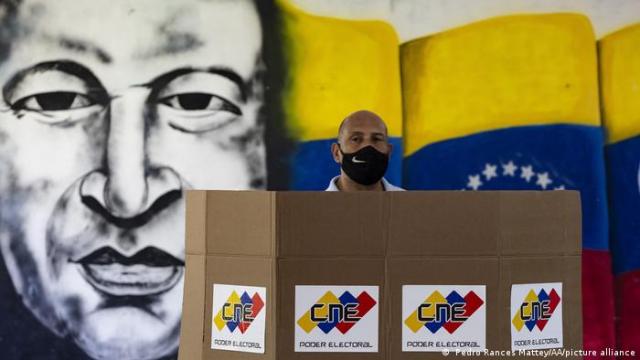
Under the view of international observers, elections in Venezuela this weekend showed low levels of interference by armed groups or organized crime. Yet, isolated outbursts of violence by pro-government gangs remained in areas where a convergence of political power and criminal economies was under threat.
By Insight Crime
Nov 25, 2021
Electoral violence was localized, with the northwestern state of Zulia bearing the brunt. In the most shocking attack, armed men described by witnesses as colectivos, a term for pro-regime armed groups, arrived at a voting center in the region’s San Francisco municipality and opened fire, killing a 38-year-old man and injuring two others.
This came after an earlier incident at a voting center in the nearby El Callao neighborhood in which colectivos reported arrived on motorcycles and shot into the air to intimidate voters.
Candidates were also victimized. In a video that circulated widely on Venezuelan social media, San Francisco legislative councilman Eduardo Labrador, of the opposition Democratic Unity Roundtable (Mesa de la Unidad Democrática – MUD), showed his bloody wounds following an alleged beating by a pro-government group.
In Táchira as well, there were reports of the National Liberation Army (Ejército de Liberación Nacional – ELN) interfering in the election. MUD candidate Fernando Andrade told Diario de Los Andes that election witnesses were unable to access voting centers due to the armed group’s presence.
Venezuelan journalist for Infobae, Sebastiana Barráez, reported on Twitter that heavily armed members of the ELN told voters in the Táchira villages of Palmarito and Los Ríos that if they were not voting for United Socialist Party of Venezuela (Partido Socialista Unido de Venezuela – PSUV) candidate Freddy Bernal, they should go home.
There were also isolated reports of violent attacks beyond Zulia and Táchira, with human rights activists Nelson Freites and Yonaide Sánchez being reportedly beaten while attempting to monitor elections in Lara.
Other acts of interference by armed groups took place before the election, with an MUD mayoral candidate for Mérida being shot at on the campaign trail in mid-November.
InSight Crime Analysis
While these elections were intended to present a positive face to the international observers the government had invited into the country, isolated violent incidents occurred in regions where not only political but also criminal interests were threatened by the possibility of electoral losses for the PSUV.
Unlike previous years, electoral violence was limited to specific geographic areas. When InSight Crime reporters visited election centers in Caracas, they observed very few voters, the palpable presence of pro-government colectivos, and several tactics that appeared to be designed to confuse and intimidate voters. Yet, there was little violence and few signs of direct interference by criminal or armed groups in the capital.
Attacks occurred instead in states where criminal and political interests have reportedly been aligned and where the opposition stood a real chance of winning elections. In Zulia, Venezuelan media reports have suggested that Governor Omar Prieto has aided local armed factions, specifically Los Leal.
Under his rule, the state has heavily targeted the members of the rival Meleán Clan, and Prieto was sanctioned in 2019 by the US Treasury Department for allowing the lucrative cross-border drug trade to continue with only limited interference from the state security forces.
PSUV rule is similarly advantageous for criminal groups in Táchira. Gubernatorial candidate and staunch Maduro ally Freddy Bernal has been described as a key link between the ELN and the Maduro regime. After being appointed as “Protector of Táchira” by Maduro allegedly hosted a 2019 meeting that featured ELN leadership and was accused of criminal links by Colombia’s then-foreign minister Carlos Holmes Trujillo.
In both states, the cross-border smuggling of drugs, people and contraband is a lucrative source of revenue for criminals and corrupt politicians. According to a political scientist interviewed shortly after the election by InSight Crime, who requested anonymity for security reasons, PSUV control in border states like Táchira and Zulia creates opportunities for soldiers and police officers to make money by facilitating criminal economies so that the regime can avoid paying them directly.
The other common factor in both hotspots of electoral violence is that the opposition offered a credible threat of defeating PSUV candidates. An opposition candidate, Manuel Rosales, was a heavy favorite and was elected in Zulia despite the violent suppression of voting, saying in a press conference “the destruction of Zulia was put to an end.”
While Táchira PSUV gubernatorial candidate Freddy Bernal eked out a win, his margin of victory was minuscule. The PSUV won 41.03 percent of the vote compared to the 40.17 percent secured by his main rival, with a loss seeming like a real possibility for the ruling party as the voting was taking place.
In a leaked WhatsApp audio message that circulated on social media during the vote, Bernal decried the low turnout and urged officials to “mobilize” the population, asking “where is the commitment of the institutions?” The ELN’s interference in voting stations began shortly after.
The stark contrast between the national trend of a relatively peaceful election and bursts of violence concentrated in areas with significant integration of criminal economies and political power suggests that these attacks were driven by local interests afraid of losing political control.
…
Read More: Insight Crime – In contested Zulia and Táchira, violence mars Venezuelan elections
…